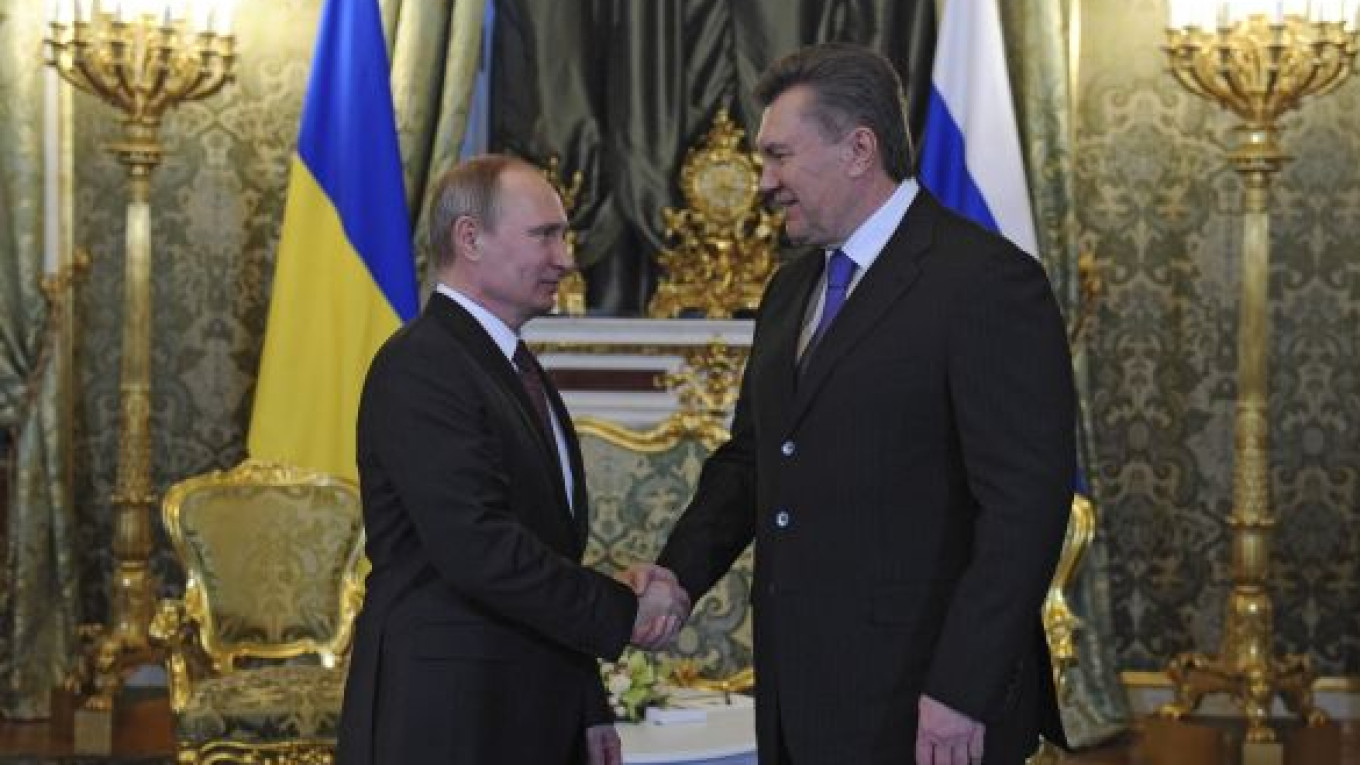President Vladimir Putin and his Ukrainian counterpart, Viktor Yanukovych, agreed to landmark deals in the Kremlin on Tuesday that will see Russia cut the price of gas supplies to Ukraine by one-third and grant Ukraine a much-needed $15 billion bailout.
The raft of agreements, which appear to secure Russia's influence over Ukraine for the time being and stall Ukraine's ambitions to move closer to the European Union, will provide much-needed assistance in keeping the suffering Ukrainian economy afloat. The funds may even last until Ukraine's 2015 presidential vote, in which Yanukovych will seek to win reelection.
For the past month, Ukraine has been caught in limbo between Russia and the EU, which has been trying to convince Ukraine to sign an association agreement. Yanukovych had originally planned to sign the deal at a summit in Lithuania last month but backed out at the last minute in favor of closer relations with Russia, triggering massive ongoing protests in central Kiev.
"Given the difficulties faced by the Ukrainian economy, which are to a large extent connected with the world financial and economic crisis, with the aim of helping the Ukrainian budget, Russia's government has made the decision to convert $15 billion of its reserves into Ukrainian bonds," Putin said following the negotiations.
Those funds will help Ukraine to pay off the more than $17 billion in loan payments that it faces next year, an amount almost equal to its central bank's depleted currency reserves. Yanukovych has cited the need for an immediate injection of cash as the main reason why he refused to sign the EU Association Agreement on Nov. 29.
The price of gas was also key for Yanukovych to maintain support in his political power base, the industrial, energy-hungry regions of eastern Ukraine, where ties with Russia are largely favored. Gas subsidies to Ukrainians were also becoming unsustainable for the Ukrainian budget.
Under the deal signed Tuesday, the price of gas that Russia sells to Ukraine will go down from $400 to $268.5 per 1,000 cubic meters. Yanukovych's government has repeatedly called the former gas deal, signed in 2009 by currently jailed former Prime Minister Yulia Tymoshenko, as "enslaving."
Speculation was rife that in return for bailout money and a gas discount, Russia would force Ukraine to join a Russia-led Customs Union with Kazakhstan and Belarus, but Putin denied that this was part of the deal. Indeed, no concessions from Ukraine to Russia in return for the cash infusion were publicly announced.
"I want to draw your attention to the fact that this is not tied to any conditions. I want to calm you down — we have not discussed the issue of Ukraine's accession to the Customs Union at all today," Putin told reporters at a news conference following the talks.
Putin has repeatedly emphasized that Russia would respect Ukraine's possible decision to establish a free-trade area with the EU, but that such a move would force Moscow to lift the current preferential trade regime between the two countries.
To hammer that point home, in the weeks before the Eastern Partnership summit in Vilnius where Ukraine was to sign the EU agreement, Russia imposed harsh restrictions on Ukrainian imports.
On Tuesday, Putin and Yanukovych signed a roadmap for lifting these restrictions.
Viktor Mironenko, head of the Center for Ukrainian Research at the Russian Academy of Sciences, said that despite its economic problems, geopolitically crucial Ukraine represented something highly valuable for both the EU and Moscow.
"Ukraine is not liability but a prize, and whoever is willing to pay the price for it first will win it," Mironenko said.
"The fact that Putin said we will help Ukraine without conditions because it is in such a difficult situation is a very powerful message," he said.
The liberalization of the trade regime between Russia and Ukraine is likely to increase the interdependence of the two economies and stifle the incentives for Ukraine to move closer to the EU. At the same time, the pro-Western opposition in Ukraine will almost certainly continue to demand integration with Europe.
"The old conflict will remain: Ukraine will be tied to Russia economically but will cling to Europe politically," Mironenko said.
Ukrainian opposition leader Vitali Klitschko, a probable rival to Yanukovych in the 2015 presidential race, said after the deals were announced Tuesday that Yanukovych had up given up national interests, independence and prospects for a better life for Ukrainians, using the country as a financial deposit to raise $15 billion, Reuters reported.
Yanukovych, who in the past has expressed a desire to balance ties with Western Europe and Russia, signaled that there was no turning back from the path chosen Tuesday.
"We need to learn our lessons for the future and never make such mistakes," Yanukovych said, referring to the trade clash with Russia.
Contact the author at [email protected]
A Message from The Moscow Times:
Dear readers,
We are facing unprecedented challenges. Russia's Prosecutor General's Office has designated The Moscow Times as an "undesirable" organization, criminalizing our work and putting our staff at risk of prosecution. This follows our earlier unjust labeling as a "foreign agent."
These actions are direct attempts to silence independent journalism in Russia. The authorities claim our work "discredits the decisions of the Russian leadership." We see things differently: we strive to provide accurate, unbiased reporting on Russia.
We, the journalists of The Moscow Times, refuse to be silenced. But to continue our work, we need your help.
Your support, no matter how small, makes a world of difference. If you can, please support us monthly starting from just $2. It's quick to set up, and every contribution makes a significant impact.
By supporting The Moscow Times, you're defending open, independent journalism in the face of repression. Thank you for standing with us.
Remind me later.


